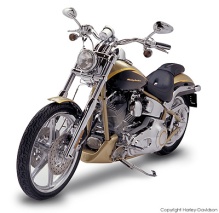What are Synthetic Lubricants?
Engines, transmissions and other mechanical systems contain hundreds of moving parts. Though the metal surfaces of these parts look smooth, they are actually full of microscopic peaks and valleys. When the peak of one surface touches its mating surface, it causes damage. Damage may lead to component surface or wear. Failure prevention and wear reduction are the primary functions of lubrication.
Refined Petroleum Oils
 Conventional oils - the oils most people are familiar with - are refined from crude oil. Refining is a process
of physically separating light oil components from heavy ones.
Conventional oils - the oils most people are familiar with - are refined from crude oil. Refining is a process
of physically separating light oil components from heavy ones.
Crude oil contains millions of different kinds of molecules. Many are similar in weight but different in structure.
The refining process cannot distinguish such molecules, so a wide assortment of molecules is present in the
finished lubricant made from crude oil stocks.
Some crude oil molecules are not beneficial to the lubrication process. For example, paraffin causes refined
lubricants to thicken and flow poorly in cold temperatures. Molecules containing sulfur, nitrogen and other
elements invite the formation of sludge and other products of lubricant breakdown, especially in high-temperature
applications. Sludge and breakdown products significantly increase wear rates.
The assorted molecules of refined lubricants also have different shapes, making lubricant surfaces irregular at
the molecular level. As lubricant layers flow across one another during the lubrication process, these
irregularities create friction, which consumes power, reduces efficiency and increases heat and wear.
"The main advantage of mineral oils is their low cost. The main limitation of mineral oils is that...the
lubricant-sized molecules have a variety of structures ranging from the best to the worst (in terms of wear
control)." - A. Jackson, Mechanical Engineering Transactions
 Synthetic Lubricants
Synthetic Lubricants
Synthetic lubricants are chemically engineered from pure chemicals rather than refined from crude oil. That
gives them significant advantages over refined oils.
Pure - The feedstocks from which synthetic lubricants are made do not contain sulfur, nitrogen or other elements
that invite the formation of sludge and other products of lubricant breakdown. Synthetic lubricants can be used
in higher temperatures than refined lubricants without breaking down. Their resistance to breakdown also allows
them to be used longer than refined lubricants can be used. Lubricated systems stay cleaner and last longer with
synthetic lubricants.
Synthetic lubricants differ from refined oil in three key ways: synthetics are pure, their molecular
structure is uniform, and they may be designed to work in applications in which refined oils cannot.
Uniform - The feedstocks from which synthetic lubricants are made feature uniform and smooth molecular structures,
which ensures low friction as lubricant layers slide across one another. Reduced friction increases energy
through-put for greater fuel efficiency and power and reduces heat and wear for longer equipment life.
Molecular uniformity also helps synthetics resist thinning in heat and thickening in cold, which helps them
protect better than refined oils over a system's operating temperature range and helps ensure secure sealing.
"Field experience has shown that synthetics can give economic benefits when used in place of mineral oils
which were working satisfactorily. The benefits fall in five general areas:
- Improved energy efficiency
- Wider operating temperature range
- Increased design ratings
- Reduced maintenance
- Better reliability and safer operation"
- A. Jackson, Mechanical Engineering Transactions
 Designable - Many different kinds of feedstock may be used to create synthetic lubricants, allowing a synthetic
to be designed for virtually any application. Some feedstocks are ideal for use in extremely cold environments.
Others are perfect for use in extreme heat. Some are extremely safe in applications in which refined lubricants
pose a fire or explosion hazard. Refined oils simply do not offer the design flexibility synthetics offer.
Designable - Many different kinds of feedstock may be used to create synthetic lubricants, allowing a synthetic
to be designed for virtually any application. Some feedstocks are ideal for use in extremely cold environments.
Others are perfect for use in extreme heat. Some are extremely safe in applications in which refined lubricants
pose a fire or explosion hazard. Refined oils simply do not offer the design flexibility synthetics offer.
The design flexibility of synthetics also allows them to be tailored very specifically to the needs of everyday
applications, such as automotive engines, commercial equipment or much industrial machinery. That specificity
helps ensure long life and peak power, performance and fuel economy from the lubricated system and long
lubricant life.
We're now on Facebook!

Buy at wholesale price!
Preferred Customers buy at dealer cost and save 25%!

Not sure which products to get for your vehicle? Use the Vehicle Lookup Guide.

AMSOIL Distributor Opportunities
Start your own home business based on a proven superior product. Very low startup costs.

Sell AMSOIL products in your shop or store. Click here for information on AMSOIL retail accounts.

Does your business purchase lubricants for its equipment? Click for information about AMSOIL commercial accounts! Extend your equipment's life and reduce costs!
